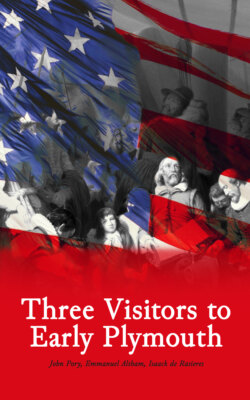Читать книгу Three Visitors to Early Plymouth - John Pory - Страница 3
На сайте Литреса книга снята с продажи.
Introduction
ОглавлениеTable of Contents
We all know what the Pilgrim Fathers wrote about themselves and their settlements on the (not so) “stern and rockbound coast”; but how many people know that they were visited thrice, between 1622 and 1627, by outsiders who left on record candid accounts of what they saw? That is the reason for this book. These three accounts—one by a gentleman from Virginia, one by an Englishman straight from England, and the other by a Dutchman from New Amsterdam—are brought together between two covers, so that we can see how the Pilgrims and New Plymouth appeared to visitors who shared neither their particular beliefs nor their intention to live in New England.
John Pory’s, the Virginian account, was discovered early in this century and published in a small limited edition, long since out of print. De Rasieres’ Dutch account is best known; it was discovered in mid-nineteenth century, was promptly translated, and has several times been printed. Three of the Altham letters have never before been printed. The manuscripts were purchased by the late Dr. Otto Fisher, who kindly permitted us to publish this editio princeps. The fourth Altham letter, printed some years ago, has been included, as it rounds out the story.
Pory’s account is valuable for the vivid description of the bounties of nature at Plymouth and along the coast of Maine. We are sorry he did not have time to investigate the Indians’ tall tale of mammoth Massachusetts oysters. He confirms Edward Winslow’s story about Governor Bradford’s exchange of diplomatic messages (snakeskin and bullets) with Canonicus, somewhat suggesting what now goes on between Washington and Moscow. Bradford refers pleasantly to Pory’s visit in his Of Plymouth Plantation chapter xiii, and notes that he borrowed the Governor’s copy of Henry Ainsworth’s Annotations upon the Fourth Book of Moses for shipboard reading on his passage to England.
The Altham letters provide the first new information about the Plymouth Colony to appear in fifty years. Captain Emmanuel Altham of the pinnace Little James, which arrived at Plymouth in 1623, gives us a fresh description of the settlement, its meager resources in livestock, and its abundant store of fish and timber. An important item for Pilgrim lore is the description of Bradford’s marriage feast, which the Governor was too modest to include in his History. Altham gives a vivid characterization of Massasoit, the guest of honor, and notes the delicacy of that chieftain in bringing only one of his five wives to the party. And he corroborates Winslow’s story of Miles Standish’s expedition against Wessagusset.
Altham, as one of the English Adventurers who financed Plymouth Colony, adds appreciably to our knowledge of how that business was done. He thoroughly disapproves of the faction among the Adventurers that was responsible for inflicting the Rev. John Lyford on Plymouth. Altham’s present to his brother of a “great king’s pipe” that “doth stink exceedingly of Indian tobacco” makes a humorous postscript to this very interesting series of letters.
De Rasieres’ letters, although well known, have never before been printed in so full and accurate a translation. They open with a description of Manhattan Island only three years after the settlement of New Amsterdam, and of the shores of Long Island Sound. They describe Algonkian Indian customs such as the making of wampum, the growing of Indian corn, with recipes for corn bread and porridge, and methods of dealing with unfaithful wives and roving husbands. Once arrived at New Plymouth, De Rasieres describes the settlement with great care—the clapboarded houses, the square fort on Burial Hill, and the Sabbath church parade to beat of drum, which has become classic. Nor does he neglect the government of the colony or the customs of the neighboring Indians.
Detractors of the Pilgrim Colony will find no ammunition in these three contemporary descriptions. The Virginian, the Englishman, and the Dutchman found much to admire in the Colony and nothing to disparage. They have given us fresh reason to respect the faith and fortitude of that little band in its struggle to maintain a toe hold on the edge of the American wilderness.
Samuel Eliot Morison
